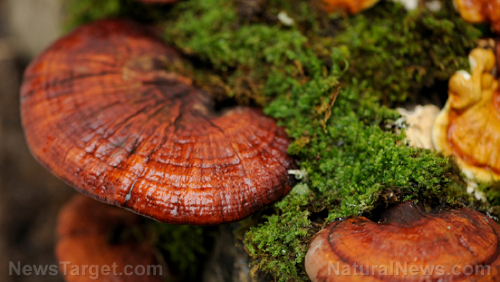Source: Hunan Agricultural University Jul 23, 2018 6 years, 8 months, 3 weeks, 6 days, 17 hours, 40 minutes ago
The medicinal mushroom known as “Reishi ” in Japan was the subject of a recent Chinese study on alternative treatments for recurrent oral ulceration (ROU). The results showed that
freeze-dried reishi mushroom powder provided effective treatment for the most prevalent mouth ulcer disease in the world.
ROU is considered an autoimmune disease. It is a frequent complication for acquired immune deficiency syndrome (AIDS) and other diseases that undermine the immune system.
There are several conventional therapies for it, one being prednisone acetate. However, they are not ideal and are often unsatisfactory in terms of effectiveness.
Many patients have instead turned to medicinal herbs or traditional Chinese medicine (TCM) to complement
Western medical treatment. One of those herbal medicines is
Ganoderma lucidium, the reishi mushroom.
Called “Lingzhi” in China, it is often used as a TCM and complementary medicine. Studies show that its fruiting body and mycelium contain bioactive ingredients that improve the immune system and gastrointestinal tract. It also has anti-ulcer effects.
The
Hunan Agricultural University (HAU) researchers chose to evaluate the freeze-dried powder form of reishi mushrooms. They evaluated its mechanism on a rat model for ROU.
Reishi mushroom powder shown to treat recurring mouth ulcers
Rats were injected with autoantigen to bring out symptoms of ROU. They were divided into five groups with one serving as the control group that only got water.
The other four groups received different doses of freeze-dried reishi mushroom powder (100, 200, or 300 milligrams per kilograms) or 125 mg/kg prednisone acetate on a daily basis. Treatment lasted for 20 days.
Several animals from different groups were sacrificed for examination. They were evaluated for histopathology and analyzed using ELISA, FCM, real-time RT-PCR, and statistical methods.
The researchers reported that the high (300 mg/kg) dosage of freeze-dried mushroom powder and prednisone acetate groups were able to extend the amount of time between each ulcer. The total number and size of each individual ulcer were also reduced.
The damaged membranes of the animals were shown to heal. ELISA analysis showed that the two treatments increased levels of TGF-β1, a
cytokine that encourages wound healing.
Only the high-dose group showed much lower levels of IL-6, a cytokine that promotes inflammation. It, the medium-dose group, and the prednisone acetate group also reduced the levels of a different pro-inflammatory cytokine, IL-7.
All treatment methods showed increases in CD4+CD25+Foxp3+Tregs, which are cells that regulate inflammation. The high-dose group showed the best in
crease, outperforming prednisone acetate.
The high-dose, medium-dose, and PA groups showed higher levels of expression by the Foxp3 gene that produces regulatory T cells. The expression of the RORyt gene, which produces pro-inflammatory cytokines, was conversely reduced.
Both high- and medium-dose freeze-dried mushroom treatments showed better greater regulatory effects on these cytokine-producing genes than the
pharmaceutical drug.
Beta-glucan might be giving reishi mushrooms its healing properties
Based on their findings, the HAU researchers concluded that high dosage of freeze-dried reishi mushroom powder displayed significant therapeutic effects in remedying recurrent oral ulceration. They propose its consideration as an alternative or complementary treatment to ROU.
They trace these benefits to the presence of beta-glucans in reishi mushrooms. Beta-glucan is a polysaccharide that modulates the immune system.
Anecdotal evidence suggests this bioactive substance
decreases the frequency and pain of ROU. As far as the researchers know, there are no official studies that covered the use of beta-glucan as a treatment method.
Like other water-soluble polysaccharides, beta-glucan is easily destroyed by heat. The researchers noted that using the freeze-drying method to preserve the mycelia of
G. lucidum preserves much larger amounts of beta-glucan when compared to conventional drying.
Reference:
Hunan Agricultural University 